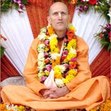Bhakti Vikasa Swami's Blog, page 340
May 29, 2012
Reply For Grhastha Queries
This is an advice to all grhastha devotees who often run into family problems and are in need of guidance and encouragement.
Download Reply For Grhastha Queries
Download Reply For Grhastha Queries
Published on May 29, 2012 07:17
Sexual Attraction Blocks Krishna’s Attraction
[B]Where:[/B] Mumbai, Maharastra, India[BR]
[B]When:[/B] 27 Jan 12[BR]
[B]Language:[/B] English[BR]
[CUT]
[diplay_podcast]
Download Sexual Attraction Blocks Krishnas Attraction
[B]When:[/B] 27 Jan 12[BR]
[B]Language:[/B] English[BR]
[CUT]
[diplay_podcast]
Download Sexual Attraction Blocks Krishnas Attraction
Published on May 29, 2012 06:31
May 28, 2012
Srila Prabhupada’s judgment on bhakti in India, 1973
Prabhupada: There is no devotee in India, real devotee, at the present
moment.
>>> Ref. VedaBase => Morning Walk — December 31, 1973, Los Angeles
moment.
>>> Ref. VedaBase => Morning Walk — December 31, 1973, Los Angeles
Published on May 28, 2012 22:15
Pancavati Dhama, Karumandurai, Tamil Nadu, India
kamasya nendriya-pritir
labho jiveta yavata
jivasya tattva-jijnasa
nartho yas ceha karmabhih
(SB 1.2.10)
Life's desires should never be directed toward sense gratification. One should desire only a healthy life, or self-preservation, since a human being is meant for inquiry about the Absolute Truth. Nothing else should be the goal of one's works.
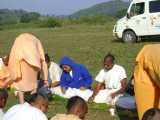
First Visit of Maharaj
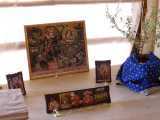
Hut Construction for Maharaj
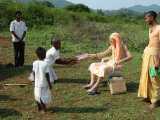
Welcoming Maharaj
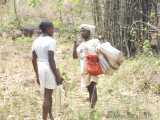
Forest
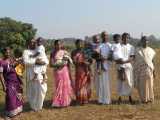
Scenery and Devotees
labho jiveta yavata
jivasya tattva-jijnasa
nartho yas ceha karmabhih
(SB 1.2.10)
Life's desires should never be directed toward sense gratification. One should desire only a healthy life, or self-preservation, since a human being is meant for inquiry about the Absolute Truth. Nothing else should be the goal of one's works.

First Visit of Maharaj

Hut Construction for Maharaj

Welcoming Maharaj

Forest

Scenery and Devotees
Published on May 28, 2012 04:34
May 27, 2012
Children of devotees
If a child takes birth in a family of devotees, this means that in his last
life he had already taken to the yoga process, but somehow or other he could
not finish it. Therefore the child is given another opportunity to make
progress under the care of a good father and mother so that he will again
advance. In this way, as soon as one completes his development of God
consciousness, then he no longer has to take birth in this material world,
but returns to the spiritual world.
From SSR
life he had already taken to the yoga process, but somehow or other he could
not finish it. Therefore the child is given another opportunity to make
progress under the care of a good father and mother so that he will again
advance. In this way, as soon as one completes his development of God
consciousness, then he no longer has to take birth in this material world,
but returns to the spiritual world.
From SSR
Published on May 27, 2012 21:41
May 26, 2012
Peace
“Do you think you’ll have peace just because there’s no war?” Prabhupada
asked at one lecture. “How can you ever have peace as long as there’s birth,
old age, disease, and death?”
From “Vrindaban Days” by Hayagriva Prabhu
asked at one lecture. “How can you ever have peace as long as there’s birth,
old age, disease, and death?”
From “Vrindaban Days” by Hayagriva Prabhu
Published on May 26, 2012 21:41
May 25, 2012
Poverty means poverty of knowledge
Poverty means poverty of knowledge. Prime minister Canakya Pandit used to
live in a thatched house or cottage but he was the dictator of India in the
days of Emperor Candra Gupta. Mahatma Gandhi your political Guru voluntarily
accepted the ways of the so called poor Indians and still he was the
dictator of India’s destiny. But was he actually poverty sticken on account
of his plain living with the primitive charkha? He was always proud of his
spiritual knowledge. Therefore it is the spiritual knowledge which makes a
man really rich and not the radio set or the motor car. Please therefore try
to understand this position of Indian culture and try to give it to the
western brothers in the prescribed standard method of the liberated persons
and that will be an exchange of Indian culture with western material
advancement and necessarily bring in a happy life in the peaceful world.
>>> Ref. VedaBase => Letter to: Jawaharlal Nehru — Bombay 4 August, 1958
(Jawaharlal Nehru died May 27, 1964)
live in a thatched house or cottage but he was the dictator of India in the
days of Emperor Candra Gupta. Mahatma Gandhi your political Guru voluntarily
accepted the ways of the so called poor Indians and still he was the
dictator of India’s destiny. But was he actually poverty sticken on account
of his plain living with the primitive charkha? He was always proud of his
spiritual knowledge. Therefore it is the spiritual knowledge which makes a
man really rich and not the radio set or the motor car. Please therefore try
to understand this position of Indian culture and try to give it to the
western brothers in the prescribed standard method of the liberated persons
and that will be an exchange of Indian culture with western material
advancement and necessarily bring in a happy life in the peaceful world.
>>> Ref. VedaBase => Letter to: Jawaharlal Nehru — Bombay 4 August, 1958
(Jawaharlal Nehru died May 27, 1964)
Published on May 25, 2012 20:56
Uninnocent Misconceptions
[B]Where:[/B] Kanhaiyadesh[BR]
[B]When:[/B] 15 Dec 11[BR]
[B]Scripture:[/B] BG 9.12[BR]
[B]Language:[/B] English[BR]
[CUT]
Download Uninnocent Misconceptions
[B]When:[/B] 15 Dec 11[BR]
[B]Scripture:[/B] BG 9.12[BR]
[B]Language:[/B] English[BR]
[CUT]
Download Uninnocent Misconceptions
Published on May 25, 2012 01:02
May 24, 2012
Origin of onions and garlic
From Transcendental Diary by Hari-sauri Prabhu
December 22 1976 – Poona
The Malhotras are the owners of Weikfield Products food company, which was
established twenty years ago. They have a very large modern house, Malhotra
Bhavan, situated on several acres of well kept land at 116 Koregaon Park,
which, unusual for India, even has a moderately sized swimming pool. At the
house Srila Prabhupada was introduced to the wives of all three brothers,
and some of their children.
As I busied myself retrieving Srila Prabhupada’s silver plate and bowls for
breakfast from our bags in the car, Haridäsa escorted His Divine Grace into
the house. A few minutes later he came out grinning and told me of an
unusual story Srila Prabhupada had narrated to our hosts. The ladies had
naturally inquired from Srila Prabhupada what would he like to eat, and his
initial response was to say “anything.” He declared he would be satisfied
with whatever they wanted to offer. But then he added, as a precaution, that
there should be no onions or garlic. They knew this to be one of our
standards, but still they were inquisitive to know why.
Prabhupäda said with a smile that eating onion and garlic is as bad as
eating cow’s flesh. And he told them a story about a Muslim king, a cow and
a brähmana.
For the Muslims, cow slaughter is a regular affair. This particular king
however, before having the cow slaughtered would call a brähmana and the
brähmana would offer prayers to the effect that “In this life these people
are slaughtering you, but in the next life you will get the chance to
slaughter them.”
So one time a brähmana came there but he felt lusty and he wanted to eat
the cow’s flesh also. However, the system was that he was not allowed to see
the slaughter going on, he was supposed to offer his prayers and then leave.
So he hid in a corner and witnessed the butchering. After the Muslims had
all taken their share of the dead cow and departed, the brähmana came to
that spot and he found an ankle of the cow. Because he was not supposed to
eat any meat, he took the cow’s ankle into the forest and buried it with the
plan that he would return in the night, cook it and eat it. When he came
back he dug out the cow’s ankle and found to his great surprise that it had
turned into onion and garlic.
Haridäsa said that Prabhupäda told the Malhotras that the cow’s hoof
transformed to garlic and the ankle became onion; garlic looks like a cow’s
hoof, and just as the cow’s ankle has several layers of flesh similarly the
onion has several layers and is the color of flesh. He finished the
narration by telling them that when you eat garlic it makes a bad smell come
in your mouth and when you cut onion it makes tears come out of your eyes.
The tears come because the cow was crying that in Kali yuga even the
brähmana wants to eat onion. The family loved the story and promised not to
serve any onions and garlic.
December 22 1976 – Poona
The Malhotras are the owners of Weikfield Products food company, which was
established twenty years ago. They have a very large modern house, Malhotra
Bhavan, situated on several acres of well kept land at 116 Koregaon Park,
which, unusual for India, even has a moderately sized swimming pool. At the
house Srila Prabhupada was introduced to the wives of all three brothers,
and some of their children.
As I busied myself retrieving Srila Prabhupada’s silver plate and bowls for
breakfast from our bags in the car, Haridäsa escorted His Divine Grace into
the house. A few minutes later he came out grinning and told me of an
unusual story Srila Prabhupada had narrated to our hosts. The ladies had
naturally inquired from Srila Prabhupada what would he like to eat, and his
initial response was to say “anything.” He declared he would be satisfied
with whatever they wanted to offer. But then he added, as a precaution, that
there should be no onions or garlic. They knew this to be one of our
standards, but still they were inquisitive to know why.
Prabhupäda said with a smile that eating onion and garlic is as bad as
eating cow’s flesh. And he told them a story about a Muslim king, a cow and
a brähmana.
For the Muslims, cow slaughter is a regular affair. This particular king
however, before having the cow slaughtered would call a brähmana and the
brähmana would offer prayers to the effect that “In this life these people
are slaughtering you, but in the next life you will get the chance to
slaughter them.”
So one time a brähmana came there but he felt lusty and he wanted to eat
the cow’s flesh also. However, the system was that he was not allowed to see
the slaughter going on, he was supposed to offer his prayers and then leave.
So he hid in a corner and witnessed the butchering. After the Muslims had
all taken their share of the dead cow and departed, the brähmana came to
that spot and he found an ankle of the cow. Because he was not supposed to
eat any meat, he took the cow’s ankle into the forest and buried it with the
plan that he would return in the night, cook it and eat it. When he came
back he dug out the cow’s ankle and found to his great surprise that it had
turned into onion and garlic.
Haridäsa said that Prabhupäda told the Malhotras that the cow’s hoof
transformed to garlic and the ankle became onion; garlic looks like a cow’s
hoof, and just as the cow’s ankle has several layers of flesh similarly the
onion has several layers and is the color of flesh. He finished the
narration by telling them that when you eat garlic it makes a bad smell come
in your mouth and when you cut onion it makes tears come out of your eyes.
The tears come because the cow was crying that in Kali yuga even the
brähmana wants to eat onion. The family loved the story and promised not to
serve any onions and garlic.
Published on May 24, 2012 21:26
Srila Prabhupada’s Books from Various Angles
Question:
Maharaj, while conversing and discussing with one devotee, I came upon one argument that was put forward at me. Srila Prabhupada said that we should understand his books from various angles. Does that mean we can understand sastra from various angles and there can be differences in understanding. How do we understand this?
Download Srila Prabhupadas Books from Various Angles
Maharaj, while conversing and discussing with one devotee, I came upon one argument that was put forward at me. Srila Prabhupada said that we should understand his books from various angles. Does that mean we can understand sastra from various angles and there can be differences in understanding. How do we understand this?
Download Srila Prabhupadas Books from Various Angles
Published on May 24, 2012 06:42

